精品-2020年中考英语语法复习7《动词的时态》
2020中考动词的时态语法
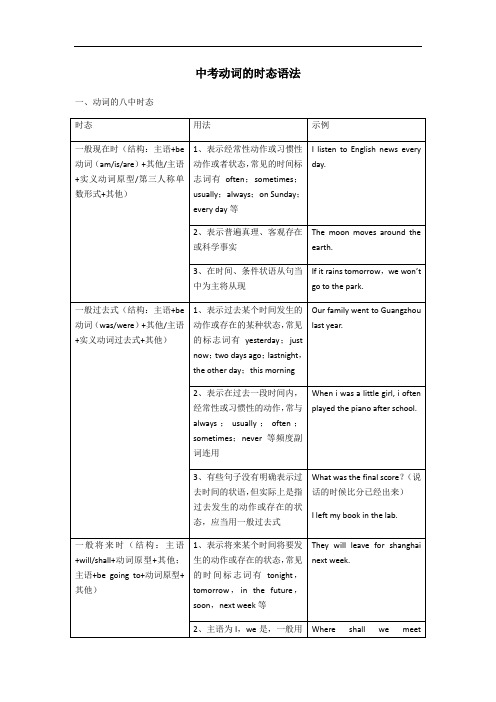
中考动词的时态语法一、动词的八中时态二、怎样确定时态1、根据时间状语特定的时间状语往往标志着特定的时态,如our team ________(win) two competitions last term. 根据时间状语last term可知赢得比赛这个动作发生在过去,应该用一般过去时,所以填won。
2、利用上下文语境判断句子的时态河北省绝大数情况下,动词的时态是由上下文的语境来决定的,如the dress ______(feel)smooth and soft. 首先分析语境:这条裙子摸起来既光滑又柔软,再根据句意以及汉语的习惯可知此处用一般现在时。
3、在复合句当中根据时态确定时态(1)主将从现原则,如果主句是一般现在时,从句是由when、after、before、not...until,as soon as等引导时间状语从句或者由if,unless等引导的条件状语从句,那么从句谓语动词用一般现在时表示将来(2)时态一致原则(3)在主从复合句中,如果主句和从句的谓语动词表示两个动作都发生在过去,那么延续性动词用过去进行时,短暂性动词用一般过去时,通常在when引导的时间状语从句中出现如:I ______to my friends on the phone when he knocked at the door. When引导的时间状语从句的时态为一般现在时态,且knocked为短暂性动词,主句表示延续性的谓语动词应用过去进行时(4)当主句的谓语动词的时态为一般现在时、现在进行时、现在完成时态时,后面所跟的宾语从句中谓语动词的时态不受主句时态的限制,可以根据具体情况选用合适的时态。
4、根据固定句型与动词时态间的对应关系确定时态(1)在祈使句+and/or +陈述句句型中,陈述句中一般将来时,即“will+动词原型(2)在this/that/it is the first time that...句型当中,that引导的从句用现在完成时。
年中考英语专题复习动词时态及语态详解
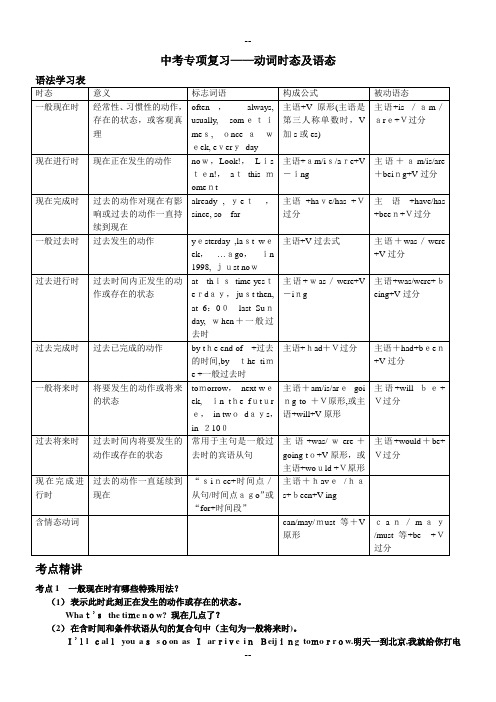
中考专项复习——动词时态及语态考点精讲考点1 一般现在时有哪些特殊用法?(1)表示此时此刻正在发生的动作或存在的状态。
What’sthe time now? 现在几点了?(2)在含时间和条件状语从句的复合句中(主句为一般将来时)。
I’ll callyou assoon as Iarrive inBeijing tomorrow.明天一到北京,我就给你打电话。
(3)在主句为过去时态的复合句中,如果宾语从句陈述的是客观真理,从句用一般现在时。
The teacher said Maria is a girl.老师说玛利亚是个女孩。
(4)表示书、信、报纸、通知、广播、告示牌等的内容用一般现在时。
Itsays,“Closed”.上面写着,“停止营业”。
专练用所给动词的适当形式填空1、T hree plus two_________(be)five.2、There____________(go)thebell!3、Light______________(travel)fasterthan sound.4、Ifyou____________(ask)her tomorrow, she will helpyou.5、The notice_______________(say)“NoSmoking!”.考点2 如何使用used to?used to后加动词原形表示“过去常常”,其疑问句和否定句可直接使用used,也可借助于did。
I used to be afraidofdark .我过去常怕黑。
He usedn’tto rideto school.他过去不常骑车去上学。
He used tosmoke,didn’the?他过去常抽烟,是吗?注意:be used to doing 意为“习惯做某事”,be used todo 意为“被用来……”,不要混淆。
专练按要求变化下面的句型1、She used to play nearthe river.(改为否定句)__________________________________________________________________________2、T he childrendidn’tuseto come here early,_____________________?(补全反意疑问句)考点3 一般将来时有哪些形式?(1)“begoing to+动词原形”表示计划或打算在最近要做的事。
中职英语语法复习专练动词的时态与语态
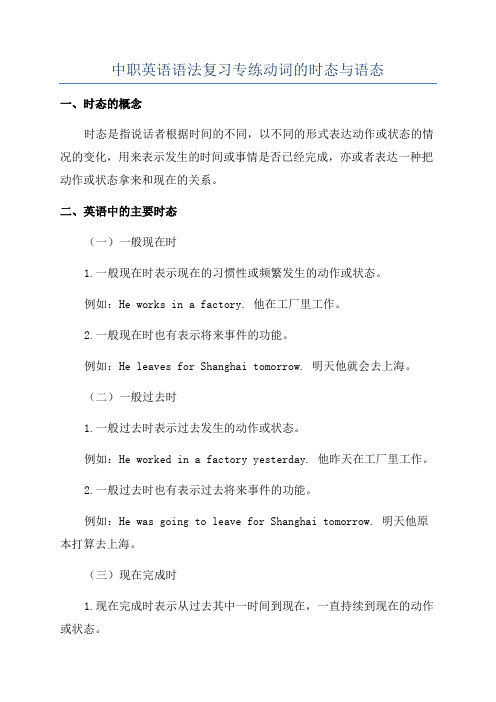
中职英语语法复习专练动词的时态与语态一、时态的概念时态是指说话者根据时间的不同,以不同的形式表达动作或状态的情况的变化,用来表示发生的时间或事情是否已经完成,亦或者表达一种把动作或状态拿来和现在的关系。
二、英语中的主要时态(一)一般现在时1.一般现在时表示现在的习惯性或频繁发生的动作或状态。
例如:He works in a factory. 他在工厂里工作。
2.一般现在时也有表示将来事件的功能。
例如:He leaves for Shanghai tomorrow. 明天他就会去上海。
(二)一般过去时1.一般过去时表示过去发生的动作或状态。
例如:He worked in a factory yesterday. 他昨天在工厂里工作。
2.一般过去时也有表示过去将来事件的功能。
例如:He was going to leave for Shanghai tomorrow. 明天他原本打算去上海。
(三)现在完成时1.现在完成时表示从过去其中一时间到现在,一直持续到现在的动作或状态。
例如:He has worked in a factory for 10 years. 他在工厂已工作 10 年。
2.现在完成时也有表示过去将来事件的功能。
例如:He had planned to leave for Shanghai tomorrow. 他原本计划明天去上海。
(四)现在进行时1.现在进行时表示正在发生的动作或状态。
例如:He is working in a factory. 他正在工厂里工作。
2.现在进行时也有表示将来时间发生的动作或状态的功能。
例如:He is going to leave for Shanghai tomorrow. 明天他将去上海。
(五)过去进行时1.过去进行时表示过去正在发生的动作或状态。
2020中考英语语法专项复习:动词的时态

【中考链接】
( ) 1. —I heard your father had gone to Beijing on business.
—Yes. And he ____A___ in three weeks. A. will return B. has returned C. returned D. returns ( ) 2. Just go down this road and you __D_____
open it?
A. knocks
B. knocked
C. is knocking D. was knocking
( ) 5. —You’re in a hurry. Where are you
going?
—To the cinema. Sue __C____ for me
outside.
A. waits
考点一:一般现在时可表示经常性或习惯性的动 作,常与often,usually,always, sometimes,every day等连用。
考点二:一般现在时可表示现在的情况或状态。 考点三:如果主句为一般将来时,在时间、条件
状语从句中,用一般现在时表示将来。 考点四:表示客观事实或永恒的真理。
( ) 5. Don’t worry. Bill will help you look after your dog when you ___A____ away on business.
A. are B. were C. will be D. have been
( ) 6. If we ___D____ take environmental problems seriously, the earth _______ worse and worse.
《动词的时态 (7)》中考专题复习课件

②表示从过去某一时刻开始一直延续到另一过去时刻的动作或状态。与现在完 成时的用法②一样,此时谓语动词应用延续性动词,常与表示一段时间的状语 连用。如: She told me that she had been a teacher for quite a few years.她告诉我她当教师多 年了。 ③过去完成时常用的时间状语:by, before短语或when, before, after, until等引导 的从句等。
高频考向八 过去将来时 1.过去将来时的构成 谓语的构成为:would+动词原形; was/were going to+动词原形 2.过去将来时的用法 ①表示从过去某一时间看来,将要发生的动作或存在的状态。多用于宾语从句 中。如: I didn't know if she would come.我不知道她是否会来。 His father said that there would be a good harvest next year.他父亲说明年将会有个 好收成。 ②表示曾经打算或准备要做的动作。此时多用“was/were+going to+动词原形 ”结构。如: She said she was going to Hawaii this summer. 她说今年夏天她准备去夏威夷。
一、根据句意及汉语提示补全下列单词。 1.—Oh, Jack, your MP4 looks nice. Is it new? —No. I ______h__a_ve__h_a_d_(买) it for two years . 2.There ______w__il_l _b_e_(有) an interesting cartoon on CCTV6 at seven thirty this evening. 3.Echo ___h_a_s_b_e_e_n__a_w(a离y 开) for half a month. She'll come back in two months. 4.Helen _______n_o_d_d_e_d_(点头) with a smile when she met me. 5.The children all ______w_e_r_e_j_u_m__p_in_g_(跳) with joy when the teacher came in.
2020年中考英语动词时态和语态复习课件PPT模板

7. —I still don't know what ___D___ while I was away
from home. —You'll know it all some day, I believe. A. had happened B. would happen C. has happened D. happened
2021/1/14
6. (2012江西)—Hello, Mum. Are you still on Lushan Mountain?
—Oh, no. We are back home. We ____B__ a really
good journey. A. have B. had C. are having D. will have
用法
例子
表示过去某一时间发 I got up at eight
生的动作或存在的状 o'clockplyayeesdterday
态。
morning.
表示过去的习惯性动 I often 作或经常发生的动作 __________(play) in (常与often, always等 that park when I was
2021/1/14
用法
表示经常性或习惯性的动作或 存在的状态,常与频度副词连 用。
例子
Jim goes to school on foot everiys day.
The sun
表示客观真理、客观存在、自 __________ (be)
然现象及俗语等。
much bigger than
the earth.
从句中,主句用现在完成 since she
时,从句用一般过去时。 __________(come) to
初中英语知识归纳总结——动词的时态

初中英语知识归纳总结——动词的时态动词的时态(一)教学重点一般现在时在英语中,不同时间里以不同方式发生的动作或存在的状态,要用不同的动词形式来表示,动词的这种不同形式称为动词的时态。
时态从时间上划分,可分为四大类:现在时;过去时;将来时;过去将来时。
从行为上,每一类可以分为四种形式:一般式;进行式;完成式;完成进行式。
这样英语的动词合起来,总共有十六种时态,初中只需掌握其中的八种时态。
1、一般现在时(1)一般现在时表示现在的状态、习惯性的动作或主语所具备的性格和能力等。
①当动词是be时,第一人称用am,第二人称用is,其他人称用are.②当动词是实义动词时,一般用动词原形,但如果主语是第三人称单数时,动词必须用第三人称单数形式,其变化规则如下:助动词do(第三人称单数用does)构成否定句、疑问句及答语,但要注意助动词后原来的谓语动词要恢复原形。
例如:I like music.I don’t like music.Do you like music?Yes, I do No, I don’t(2)一般现在时的用法①表示经常、习惯性动作,常和often, usually, every day, sometimes, always 等时间状语连用。
如:He goes to school by bus every day.They often play football②表示能力、职业、特征。
如:Miss Gao teaches English.Do you speak Japanese?③表示客观存在。
如:The earth moves round the sun.Time and tide wait for no man.④表示已经安排好或计划好的事。
如The plane takes off at 7:30.Classes begin at 8:00⑤在时间状语和条件状语从句中,主句用一般将来时,从句用一般现在时。
中考中的动词时态知识点总结与归纳
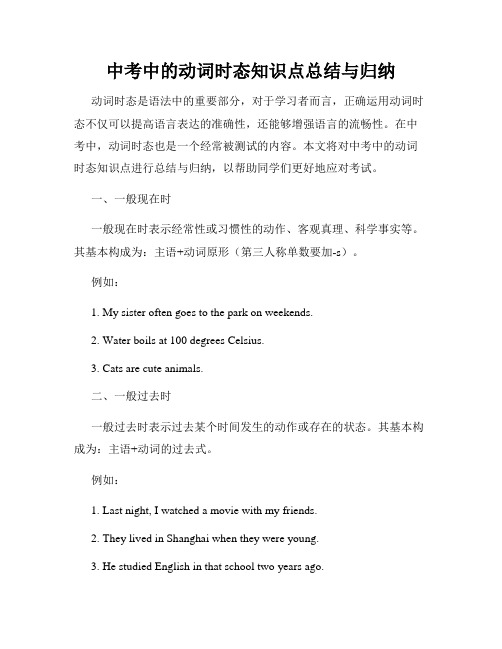
中考中的动词时态知识点总结与归纳动词时态是语法中的重要部分,对于学习者而言,正确运用动词时态不仅可以提高语言表达的准确性,还能够增强语言的流畅性。
在中考中,动词时态也是一个经常被测试的内容。
本文将对中考中的动词时态知识点进行总结与归纳,以帮助同学们更好地应对考试。
一、一般现在时一般现在时表示经常性或习惯性的动作、客观真理、科学事实等。
其基本构成为:主语+动词原形(第三人称单数要加-s)。
例如:1. My sister often goes to the park on weekends.2. Water boils at 100 degrees Celsius.3. Cats are cute animals.二、一般过去时一般过去时表示过去某个时间发生的动作或存在的状态。
其基本构成为:主语+动词的过去式。
例如:1. Last night, I watched a movie with my friends.2. They lived in Shanghai when they were young.3. He studied English in that school two years ago.三、一般将来时一般将来时表示将来某个时间要发生的动作或存在的状态。
其基本构成为:主语+will/shall+动词原形。
例如:1. I will go to Beijing next week.2. She will study hard for the exam.3. They shall visit their grandparents during the summer vacation.四、现在进行时现在进行时表示现在正在进行的动作。
其基本构成为:主语+am/is/are+动词-ing。
例如:1. We are having dinner.2. He is playing basketball in the park.3. They are studying for the test.五、过去进行时过去进行时表示过去某个时间正在进行的动作。
初中英语动词的时态
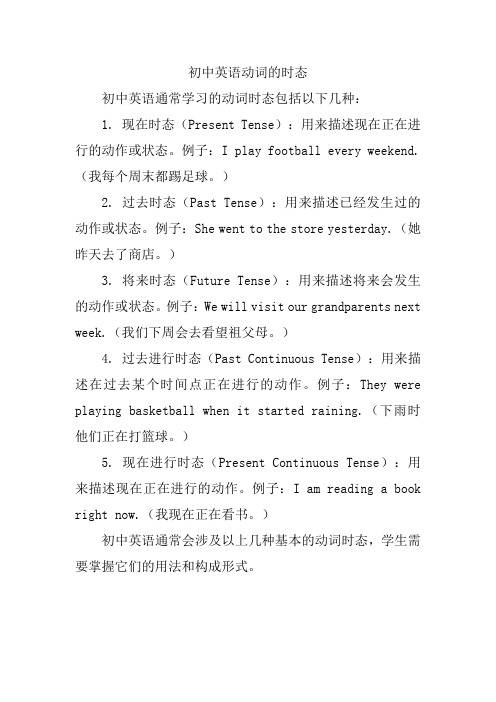
初中英语动词的时态
初中英语通常学习的动词时态包括以下几种:
1. 现在时态(Present Tense):用来描述现在正在进行的动作或状态。
例子:I play football every weekend.(我每个周末都踢足球。
)
2. 过去时态(Past Tense):用来描述已经发生过的动作或状态。
例子:She went to the store yesterday.(她昨天去了商店。
)
3. 将来时态(Future Tense):用来描述将来会发生的动作或状态。
例子:We will visit our grandparents next week.(我们下周会去看望祖父母。
)
4. 过去进行时态(Past Continuous Tense):用来描述在过去某个时间点正在进行的动作。
例子:They were playing basketball when it started raining.(下雨时他们正在打篮球。
)
5. 现在进行时态(Present Continuous Tense):用来描述现在正在进行的动作。
例子:I am reading a book right now.(我现在正在看书。
)
初中英语通常会涉及以上几种基本的动词时态,学生需要掌握它们的用法和构成形式。
中考语法知识点归纳动词时态语态与非谓语动词
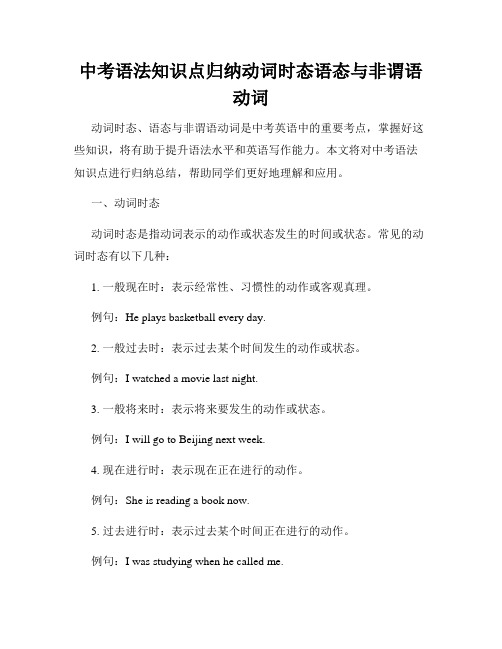
中考语法知识点归纳动词时态语态与非谓语动词动词时态、语态与非谓语动词是中考英语中的重要考点,掌握好这些知识,将有助于提升语法水平和英语写作能力。
本文将对中考语法知识点进行归纳总结,帮助同学们更好地理解和应用。
一、动词时态动词时态是指动词表示的动作或状态发生的时间或状态。
常见的动词时态有以下几种:1. 一般现在时:表示经常性、习惯性的动作或客观真理。
例句:He plays basketball every day.2. 一般过去时:表示过去某个时间发生的动作或状态。
例句:I watched a movie last night.3. 一般将来时:表示将来要发生的动作或状态。
例句:I will go to Beijing next week.4. 现在进行时:表示现在正在进行的动作。
例句:She is reading a book now.5. 过去进行时:表示过去某个时间正在进行的动作。
例句:I was studying when he called me.6. 现在完成时:表示过去的动作对现在造成的影响或结果。
例句:She has visited Paris three times.7. 过去完成时:表示对过去某个时间之前发生的动作进行的描述。
例句:They had already left when I arrived.二、动词语态动词语态是指动作发出的主体和动作所受的影响关系。
英语中常见的动词语态有以下几种:1. 主动语态:表示主语是动作的发出者。
例句:He fixed the car yesterday.2. 被动语态:表示主语是动作的承受者。
例句:The car was fixed by him yesterday.3. 进行时态:表示主语正在进行的动作处于进行状态。
例句:The book is being read by her.4. 完成时态:表示主语已经完成的动作处于完成状态。
例句:The book has been read by her.注意:被动语态需要根据动作的时态来变换,同时需要适当更改时态动词。
2020年九年级中考复习英语语法《动词的时态》专题练附答案
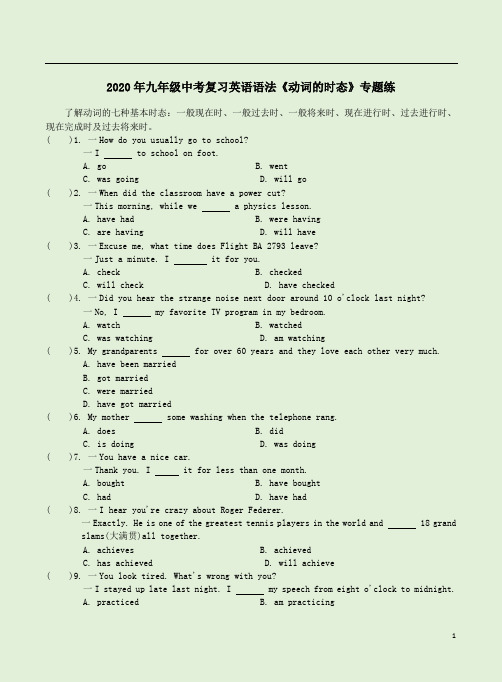
2020年九年级中考复习英语语法《动词的时态》专题练了解动词的七种基本时态:一般现在时、一般过去时、一般将来时、现在进行时、过去进行时、现在完成时及过去将来时。
( )1. 一How do you usually go to school?一I to school on foot.A. goB. wentC. was goingD. will go( )2. 一When did the classroom have a power cut?一This morning, while we a physics lesson.A. have hadB. were havingC. are havingD. will have( )3. 一Excuse me, what time does Flight BA 2793 leave?一Just a minute. I it for you.A. checkB. checkedC. will checkD. have checked( )4. 一Did you hear the strange noise next door around 10 o'clock last night?一No, I my favorite TV program in my bedroom.A. watchB. watchedC. was watchingD. am watching( )5. My grandparents for over 60 years and they love each other very much.A. have been marriedB. got marriedC. were marriedD. have got married( )6. My mother some washing when the telephone rang.A. doesB. didC. is doingD. was doing( )7. 一You have a nice car.一Thank you. I it for less than one month.A. boughtB. have boughtC. hadD. have had( )8. 一I hear you're crazy about Roger Federer.一Exactly. He is one of the greatest tennis players in the world and 18 grand slams(大满贯)all together.A. achievesB. achievedC. has achievedD. will achieve( )9. 一You look tired. What's wrong with you?一I stayed up late last night. I my speech from eight o'clock to midnight.A. practicedB. am practicingC. was practicingD. has practiced( )10. 一Do you know the Color Run, a five-kilometer race?一Yes. So far it into quite a few cities in our country.A. comesB. cameC. has come( )11. The house belongs to Mr. Smith, but he here any more.A. hasn't livedB. didn't liveC. wasn't livingD. doesn't live( )12. 一Lily, where is my dog?一Look! It under the bed.A. sleptB. was sleepingC. is sleepingD. will sleep( )13. Simon looks worried because he a writing competition and now he's waiting for the result.A. entersB. enteredC. will enterD. is entering( )14. 一What's the matter, Jack?一I down while I on the ice. I got hurt badly.A. was falling; skatedB. fell; was skatingC. fell; skatedD. was falling; skating( )15. 一Where's your brother?一Oh, he the library and .A. has been to; so Lucy isB. has gone to; so Lucy hasC. has gone to; so has LucyD. has been in; so has Lucy( )16. 一Look! Your teacher Miss White is over there.一No, it can't be her. She to Beijing.A. has goneB. has beenC. wentD. will go( )17. The earth is a planet and it around the sun.A. goesB. goC. will goD. went( )18. When you me last night, I the piano.A. were calling; was playingB. were calling; playedC. called; playedD. called; was playing( )19. 一Did you watch the football match on TV last night?一I wanted to, but my father his favorite TV program.A. watchedB. watchesC. was watchingD. had watched( )20. 一I wonder if Tom this afternoon.一Don't worry. I will tell you as soon as he .A. will come; comesB. comes; will comeC. comes; comes( )21. I've just returned from my trip to London. I many interesting places there.A. visitB. will visitC. am visitingD. visited( )22. Since we began to use the Internet, our lives a lot.A. changeB. had changedC. will changeD. have changed( )23. With the development of science and technology, robot cooks in our families in the future.A. appearB. appearedC. will appearD. is appearing( )24. A little effort every day, and you a big difference.A. makesB. madeC. have madeD. will make( )25. 一Look at my new smartphone.一Wow, it's so cool. When and where you it?A. do; buyB. have; bougtacC. did; buyD. have; had( )26. 一I saw Mr. Smith in the office at ten yesterday morning.一That's impossible. He an English party with us then.A. hasB. hadC. was havingD. has had( )27.一Can you tell me when you are going to arrive there?一I'm not sure. But I'll ring you up as soon as I there tomorrow.A. arriveB. arrivedC. will arriveD. am going to arrive ( )28. Lily is my classmate. We each other since she came to our school.A. knowB. knewC. have knownD. will know( )29.一Oh, my God! I you were in Beijing, too! When did you come?一I have lived in Beijing since 2015.A. don't knowB. didn't knowC. haven't knownD. wasn't known( )30. John and I to visit his grandparents last Sunday afternoonA. goB. wentC. will goD. have gone( )31. 一Where were Bill and David when the teacher came in?一They in the hallway.A. are talkingB. have talkedC. were talkingD. talk( )32. Don't make any noise, because the baby in the next room.A. is sleepingB. sleepsC. will sleepD. was sleeping( )33. 一Look out! Something down from the building.一Dear me! It's too dangerous.A. fellB. fallsC. is falling( )34. 一I wonder if our foreign teacher Mr. White to his hometown next Tuesday.一I'm not sure. But if he returns to his hometown, I him off.A. returns; seeB. will return; seeC. will return; will see ( )35. 一Where is your uncle, Jane?一He is in Guangzhou. He for a month.A. has leftB. has goneC. leftD. has been away( )36. 一Linda is not coming for the party tonight.一But she !A. promisesB. promisedC. will promiseD. had promised( )37. 一How many children do most post-80s' families have?一One. They two in the future, I guess.A. will haveB. hadC. haveD. have had( )38. 一Hey, Kate. I called you at 6: 30 yesterday evening, but you didn't answer.一Oh sorry. I at that time.A. am doing the dishesB. do the dishesC. was doing the dishes( )39. His grandmother for 6 years. But he still misses her very much.A. diedB. has diedC. has been deadD. has been died( )40. 一Paul, I'm busy cooking. Can you give me a hand?一Just a minute. I my e- mail.A. am checkingB. will checkC. have checkedD. was checking( )41. I don't know when he back. Please tell me when he back.A. comes; comesB. comes; will comeC. will come; comes( )42. 一I want to know if he back tomorrow.一I'll call you as soon as he .A. will come; will returnB. will come; returnsC. comes; will return( )43. (2017·凉山)一Last night I went to a concert of Chinese folk music. Erquan Yingyue was sosad but beautiful that I sensed a strong sadness and pain under the beauty.一So it was. The musician who played it last night to play the erhu since hevery young.A. learned; wasB. has learned; amC. has learned; wasD. learned; has been( )44. Several journalists the lawyer about the international case an hour ago.A. interviewB. interviewedC. will interviewD. had interviewed( )45. Even if you learn something well, you it unless you use it.A. forgetB. forgotC. have forgottenD. will forget( )46. He said he to join the basketball club.A. wantsB. is wantingC. wantedD. has wanted( )47. Lin Tao isn't here now. He to Qingdao.A. goesB. wentC. has beenD. has gone( )48.一I wonder if it tomorrow.一Don't worry. If it ,we'll stay at home.A. rains; rainsB. will rain; rainsC. rains; will rainD. will rain; will rain( )49. 一Can I speak to Mrs. Thomson?一Hold on please. She dishes in the kitchen.A. washesB. has washedC. washedD. is washing( )50. Mr. Liu waiting here for about five minutes.A. has beenB. has comeC. cameD. arrived( )51. If it doesn't rain this weekend, we a picnic in the Jinquan Park.A. haveB. will haveC. have hadD. had( )52. 一Did you do anything interesting last Sunday?一Not really. I just at home.A. stayB. stayedC. will stayD. am staying( )53. 一 Where is your mother, Tom?一She the flowers in the garden.A. watersB. is wateringC. wateredD. has watered( )54. Look on the bright side of life, and imagine that you a happy and successful future.A. hadB. will haveC. haveD. have had( )55. It's nice to see you again. We each other since 2016.A. won't seeB. haven't seenC. don't seeD. didn't see( )56. Please be quiet! The students an exam.A. takeB. are takingC. tookD. were taking( )57. 一Did you watch Running Man last night? It was so exciring.一No. I with my grandpa then.A. have talkedB. am talkingC. was talkingD. talked( )58. 一I want to know if your pen pal tomorrow.一If she tomorrow, we'll give her a big surprise.A. will come; will comeB. will come; comeC. will come; comesD. comes; will come( )59. 一What were you doing at nine o'clock last night?一 .A. I take a showerB. I took a showerC. I was taking a showerD. I am taking a shower( )60. My good friend, Lily, to see me next month.A. cameB. comeC. comesD. will come( )61. 一She to anyone for 2 days.一What happened to her?A. didn't speakB. hasn't spokenC. doesn't speakD. haven't spoken( )62. 一It's very dangerous to swim in the pool. Look at the sign.一Oh, I notice it. Thanks for telling me.A. won'tB. don'tC. haven'tD. didn't( )63. Wow! You dinner! Let's eat now.A. cookB. are cookingC. will cookD. have cooked( )64. She wasn't happy because she the concert given by her favorite singer.A. missesB. missedC. will missD. is missing( )65. Betty hard since last term. That's why her exam results are so good!A. has workedB. will workC. workedD. was working( )66. Don't take the dictionary away. I it.A. useB. usedC. am usingD. have used( )67. I'll lend you the storybook as soon as I it.A. will finish readingB. will finish to readC. finish readingD. finish to read( )68. 一Did you hear someone knock at the door just now?一Sorry. I to my friend on the phone.A. was talkingB. talkedC. am talking( )69. 一I'm sorry for being late.一Never mind. The meeting for only 5 minutes. This way, please.A. has begunB. has endedC. has been on( )70. I in the city since I left school.A. liveB. will liveC. was livingD. have lived( )71. I am surprised at the new look of my hometown for it a lot over the years.A. changedB. changesC. will changeD. has changed( )72. Some of my classmates an English play at the art festival two days ago.A. haveB. hadC. has( )73. 一Hello, John. This is Mike. What are you doing now?一I'm watching a football match. It started at 7:30 p. m, and on for another onehour.A. has beenB. wasC. will be参考答案1-10 ABCCADDCCC 11-20 DCBBCAADCA 21-30 DDCDCCACBB31-40 CACCDBACCA 41-50 CBCBDCDBDA 51-60 BBBBBBCCCD61-70 BDDBACCACD 71-73 DBC。
【名师整理】2020年中考语法高频考点提升训练专题7 动词时态与语态

专题7 动词时态与语态考点一、动词时态的分类及其应用1、一般现在时的用法1) 表示经常性或习惯性的动作。
如:I leave home for school at 7 every morning. 2) 表示普遍真理,客观存在,科学事实。
如:The earth moves around the sun. 2、一般过去时的用法1)在确定的过去时间里所发生的动作或存在的状态。
如:Where did you go just now? 2)表示在过去一段时间内,经常性或习惯性的动作。
如:When I was a child, I often played football in the street. 3、现在进行时1) 表示现在( 指说话人说话时) 正在发生的事情。
如:We are waiting for you.2)表示长期的或重复性的动作,说话时动作未必正在进行。
如:Mr. Green is writing another novel. (说话时并未在写,只处于写作的状态。
)3)短暂性动词的进行时一定表示将来的含义。
如:We are arriving at London. 4、过去进行时1)过去进行时主要表示过去某个时刻正在进行的动作,常和表示过去的状语连用。
如:What were you doing at nine last night? 昨晚九点的时候,你在做什么?2)过去进行时也可以表示过去某一段时间内正在进行的动作。
如:From 1983 to 1998 , he was teaching at Yale .从1983到1998年,他正在耶鲁大学教书。
时态(表现在实义动词的形式变化上 时态名称 及物动词必须跟宾语 不及物动词不直跟宾语谓动的表现形式 一般现在时 一般过去时 现在进行时 过去进行时 一般将来时 ★过去将来时 现在完成时 ★过去完成时do/第三人称单数形式does did (谓语动词用过去式) (am/ is/ are )be+doing was/were+doing will+do (动词原形) would+do (动词原形) have/(第三人称用has)+donehad+done(过去分词)需要(有实在意义) 有明显的时间标志用法表示平时经常或习惯性动作 某次过去做某事 现在正在做某事 过去正在做某事 现在将要做某事 过去将要做某事 到现在已经做某事 到过去已经做某事5、一般将来时1)表示将来某个时间要发生的动作或存在的状态,也表示将来经常或重复发生的动作。
2020中考英语:动词时态专题详解

1、用法:表示过去发生的动作或存在的状态。
2、动词形式:did 即动词的“过去式”e.g. I played basketball yesterday.My family moved here last year.Tom was here just now.I went to town a few days ago.3、与一般过去时态连用的时间状语:yesterday yesterday morning last night last Tuesday last year last …… a few days ago two years ago …… ago in 2002等。
4、规则动词过去式的构成:1)直接加-ed:visited played finished2)去e 加-ed:dance—danced recite—recited3)以"一个元音+一个辅音"的重读闭音节结尾的单词,双写该辅音字母再加-ed: plan—planned chat—chatted prefer—preferred4)以辅音字母+y结尾的单词,变y为i再加-ed:study—studied fly—flied carry—carried二、一般将来时态1、用法:表示将要发生的动作或存在的状态。
2、动词构成:1) will(shall) + 动词原型2)be going to + 动词原型e.g. My mother will buy me a new bike tomorrow.I am going to clean the car for my father next Sunday.It's going to rain this afternoon.3、与一般将来时态连用的时间状语:tomorrow tomorrow afternoon next month next October next year next …… in two days等。
初中英语2024届中考语法复习动词时态知识讲解

中考英语语法复习动词时态知识讲解一、时态定义* 时态是英语谓语动词的一种形式,表示动作发生的时间和所处的状态。
* 英语中的时态是通过动词形式本身的变化来实现的。
英语中主要有十六种时态,在初中英语阶段主要掌握六种时态:一般现在时、现在进行时、一般将来时、一般过去时、过去进行时以及现在完成时。
二、一般现在时(一)一般现在时用法:1.一般现在时表示习惯性的动作、讲话时人或物的特性或状态。
Eg: I go to school on foot every day.我每天走路上学She has a cute dog.她又一只可爱的狗。
2.表示自然现象或客观真理时Eg: Light travels more quickly than sound.光的传播速度比声音快。
The Earth goes around the Sun.地球绕着太阳转。
3.在if引导的条件状语从句中,从句用一般现在时Eg: If it rains tomorrow, I will stay at home.如果明天下雨我就呆在家里。
(二)一般现在时的结构1.结构:肯定式:主语 + 谓语动词 + 其它否定式:主语 + don't + 谓语动词 + 其它一般疑问句:Do + 主语 + 谓语动词 + 其它特殊疑问句:特殊疑问词 + 一般疑问句注意:当主语是第三人称单数时,谓语动词要用三单形式,助动词do要变为does。
Eg: 肯定句: I work in Beijing.我在北京工作。
She works in Beijing.她在北京工作。
否定句:I don’t work in Beijing.我不在北京工作。
She doesn’t work in Bejing.她不在北京工作。
一般疑问句:Do you work in Bejing?你在北京工作吗?Does she work in Beijing?她在北京工作吗?特殊疑问句: Where do you work?你在哪工作?Where does she work?她在哪工作?2.动词三单形式变化规则(1)一般情况下直接加-s;Eg: cook -- cooks; work -- works(2)以s, x, ch, sh, o结尾的动词加-es;Eg: catch -- catches; go -- goes; do -- does(3)以辅音加y结尾,将y变成i再加-es;Eg: study -- studies; try -- tries(4)特殊变化:have -- has(三)一般现在时时间标志词一般现在时常与every day, often, usually, always, seldom, sometimes等时间状语连用。
2020年中考英语基础语法专题: 动词的时态

专题动词的时态学前自测(发现考点)( )1. —When did you meet your English teacher?—While I ____ a bike along Jiaomen River.A. rodeB. was ridingC. rideD. will ride( )2. He ____ computer games when his parents left home. So he didn't know where they were.A. is playingB. playsC. playedD. was playing ( )3. As usual, Sally ____ at 6:30 this morning by her mother to have breakfast.A. has woken upB. woke upC. was woken upD. wakes up( )4. —I was at the cinema at nine o’clock yesterday evening. What about you?— I ____ TV at home.A. watchB. watchedC. am watchingD. was watching( )5. —Where is your mother? —She ____ in the kitchen.A. cooksB. has cookedC. cookedD. is cooking( )6. Tom like reading. He ___ picture books with his dad every evening.A. readB. readsC. is readingD. has read( )7. —Nicole, I missed today’s lesson, can you lend me your notebook?—Sorry, I _____ it to Betty already.A. lendB. lentC. will lendD. have lent( )8. We have two days off a week. We ___ at school from Monday to Friday.A. will studyB. studyC. studiedD. are studying ( )9. —Have you ever been to Disneyland? —Yes. I ____ there last summer.A. will goB. wentC. have goneD. was going( )10. —Do you know the film Big Hero 6?—Sure. I like it very much and I ___ it three times since it was on.A. seeB. sawC. have seenD. am seeing常考考点知识清单(研习考点)考点一一般现在时1. 概念:一般现在时主要表示经常性或习惯性的动作或存在的状态,也可表示现在的情况或状态以及永恒的真理。
- 1、下载文档前请自行甄别文档内容的完整性,平台不提供额外的编辑、内容补充、找答案等附加服务。
- 2、"仅部分预览"的文档,不可在线预览部分如存在完整性等问题,可反馈申请退款(可完整预览的文档不适用该条件!)。
- 3、如文档侵犯您的权益,请联系客服反馈,我们会尽快为您处理(人工客服工作时间:9:00-18:30)。
2020年中考英语语法复习方案7《动词的时态》【趋势解读】时态是英语学习中的核心内容之一,是英语学习的基础。
自然,时态考查是各种英语考试尤其是中考时的座上宾。
动一作发生的时间决定时态,时态决定动词的形式,而考卷中的时态题通常没有给出明确的时间标志词,考生需领悟所提供的语境来做出判断。
只有推断出动作发生的正确的时间,才可能正确答题。
这就要求考生在熟练掌握基本时态结构、用法并牢记常用的时间状语的基础上,要充分利用上下文中隐含的信息来捕捉时间,找准答题的突破口。
预计中考关于本专题知识的命题趋势如下:(1)各地中考时态考查的热点为课标要求初中考生掌握的六种时态:一般现在时、一般过去时、一般将来时、现在进行时、过去进行时、现在完成时。
(2)自主招生考试主要考查过去完成时、现在完成进行时和过去将来时及初中常考时态的特殊用法,如状语从句中用一般现在时表示将来,对考生要求较高,命题呈现“情景立意和能力立意”的原则,体现初高中英语的衔接。
【思维引导】精彩笔记1 一般时态(一)1.什么是时态时态所要解决的是动作所发生的时间和动作的方式的问题,即“时(时间)和体(动作方式)的结合”。
英语中的时间概念有四种:过去、现在、将来和过去将来。
过去将来是一个比较时间概念,是指相对于某一过去时间或动作的将来,而不考虑相对于现在是过去还是将来。
2.一般时态(一般体)动作的方式(也叫体)有四种:一般、进行、完成和完成进行。
“一般时态”即是“不特殊”,表示既不“进行”,又不“完成”。
一般时态中的一般现在时、一般过去时、一般将来时分别表示现在、过去、将来的经常性、习惯性的动作或状态。
3.一般现在时的用法一般现在时除了可以表示现在的经常性、习惯性动作或状态外,还可以表示:(1)一般现在时表示客观真理、科学事实及自然现象。
此用法即使出现在过去语境中,也用一般现在时。
如:The sun rises in the east.太阳从东方升起。
The teacher told us that the water boils at 100℃.老师告诉我们水在摄氏100度沸腾。
(2)用于here, there开头的倒装句中,一般现在时表示现在正在发生的动作或存在的状态。
如:There goes the bell.铃响了。
Here comes the bus.公共汽车来了。
核心题根1 (1)一Is your mother a teacher?—Yes, she is. She at a junior high school.A. taughtB. teachesC. will teachD. is teaching思路点拨:此题关注的是母亲现在的工作情况,故用一般现在时,又主语为单数第三人称,动词应为单数第三人称形式。
(2)“Life is like walking in the snow,”Granny used to say,“because every step .”A. has shownB. is showingC. showsD. showed思路点拨:扔奶过去常说:“生活就好像在雪中行走,每一步都要留下足迹。
”引号中是说话当时的情景,可以不用过去时,根据说话的需要该用什么时态就用什么时态。
另外本题中奶奶的话是个警句,泛指世间的哲理,所以要用一般现在时表示。
(3) If we now to protect the environment, we'll live to regret it.A. hadn't actedB. haven't actedC. don't actD. won't act思路点拨:句意:如果现在我们不采取行动保护环境,将来我们会后悔的。
根据语法要求,在复合句中,如果主句谓语动词为一般将来时,时间状语从句、条件状语从句、让步状语从句中要用一般现在时表示将来的动作或状态。
(4)My parents in Hong Kong. They were born there and have never lived anywhere else.A. liveB. livedC. were livingD. will live思路点拨:统观全句三个谓语动词“居住”“出生(were born)”“从未住过别处(have never lived anywhere else)”,因为用到现在完成时,可知到目前为止其父母一直住在香港。
因此可以推断第一句要表达的意思是其父母现在居住在香港的状况。
所以要用一般现在时表示。
同类变式1 (1) The house belongs to my aunt but she here any more.A. hasn't livedB. didn't liveC. hadn't livedD. doesn't live(2)—Do you have any idea what Paul does all day?一As I know,he spends at least as much time playing as he .A. writesB. does writingC. is writingD. does write(3) Look at the timetable. Hurry up! Flight 4026 off at 18:20.A. takesB. tookC. will be takenD. has taken知识归纳一般现在时主要用动词原形表示,如果主语为第三人称单数,则一般在动词原形后加-s 或be的变化:am, is, are。
have的变化:has, haven。
易错警示涉及一般现在时的时态呼应问题:一般现在时可用在由if , unless引导的条件状语从句中,由when, before, until/till, as soon as, the moment , once引导的时间状语从句中,由no matter what/who/which/when/ where/ how或whatever, whoever, whichever, whenever, wherever, however及even if引导的让步状语从句中表将来,这时要求主句是一般将来时或暗指将来。
如:I'll go with you as soon as I finish my work.我一完成工作就跟你走。
Whatever you say, I will not change my mind.无论你说什么,我都不会改变主意。
精彩笔记2 一般时态(二):一般过去时的用法(1)表示过去某一时间发生的动作或存在的状态。
如:She traveled every winter.她过去每年冬天去旅行。
(2)表示过去的习惯或经常发生的动作。
如:My grandpa often told us stories on summer evenings.我爷爷常在夏夜给我们讲故事。
(3)used to+动词原形,表示过去的习惯性动作而现在已经不再发生了。
如:We used to spend our vacation in the mountains.我们以前常常在W里度假。
(暗示现在不再在山里度假了)(4)在虚拟条件句中,对现在或将来情况的假想陈述时,条件句一般用过去时。
如:She would enter a good university if she didn't die.如果她还活着,她会上一所好大学。
(5)在时间、条件、让步状语从句中,用一般过去时代替过去将来时,表示过去将来的动作。
如:He told me that he wouldn't go back until his mother promised.他对我说直到他妈妈答应他才会回家。
(一般过去时代替过去将来时)核心题根2 (1)—A nice car j Is it yours?—No, it isn't. I it from a friend of mine two days ago.A. borrowB. have borrowedC. will borrowD. borrowed思路点拨:此题有具体明确的过去时间two days ago,故叙述的事情发生在过去,用一般过去时。
(2)—Kevin, you look worried. Anything wrong?—Well, I a test and I'm waiting for the result.A. will takeB. tookC. had takenD. take思路点拨:句意:—Kevin,你看起来有些担心的样子。
有什么麻烦的事吗?一嗯,我参加了一个测试,正在等结果呢。
根据waiting for the result可知考试已结束了,是完成了的动作,因此排除一般现在时的D项和一般将来时的A项。
C项为过去完成时,应该表示过去的过去发生的动作和行为,但本题中并没有这样的时间状语。
(3) Our friendship quickly over the weeks that flowed.A. had developedB. was developingC. would developD. developed思路点拨:句意:我们的友谊在接下来的几周里迅速发展。
本题所给的时间状语为over the weeks that followed(在接下来的几周里),从followed就可看出“迅速发展”是在过去的一段时间里发生的动作,所以要用一般过去时表示。
同类变式2 (1)—When will Uncle Sam come to see us? —He'll visit us this weekend. He me that by email.A. toldB. is toldC. will tellD. was going to tell(2) The three of us around Europe for about a month last summer.A. travelledB. have travelledC. had travelledD. travel(3) If you don't like the drink you , just leave it and try a different one.A. orderedB. are orderingC. will orderD. had ordered知识归纳1.一般过去时的构成(3)注意以元音字母加y结尾的动词,直接加-ed。
